If you're looking to elevate your Volkswagen GTI's performance and sound in 2024, you might want to contemplate the best exhaust systems available. From the BORLA Cat-Back options that provide a classic tone to the MagnaFlow system with proven gains for older models, there's a range of choices to fit your needs. But what factors should you weigh when selecting the right exhaust? Each option has its unique benefits, and understanding these can make all the difference in your driving experience. Let's explore what sets these systems apart.
Quick Takeaways
- BORLA Cat-Back for MK7 GTI: Offers a balanced sound profile with moderate cruising noise and aggressive full throttle performance; rated 4.3/5 by users.
- MagnaFlow Performance Exhaust for 2006-2009 GTI: Provides dyno-proven horsepower gains, a mild tone, and minimal drone, achieving a perfect 5.0 customer rating.
- BORLA Cat-Back for Jetta GLI MK6: Features a deep growl, easy installation, and is priced competitively, making it a popular choice among enthusiasts.
- Stainless 4 Pipe Exhaust for Type 1 VW: Ideal for dune buggies, offers deeper sound and easy installation without modifications, enhancing aesthetics and engine access.
- Dsycar Exhaust Tips: Enhances exhaust aesthetics for VW and BMW vehicles, made of corrosion-resistant stainless steel, with easy installation and positive user feedback.
BORLA Cat-Back Performance Exhaust System for Volkswagen Golf GTI MK7
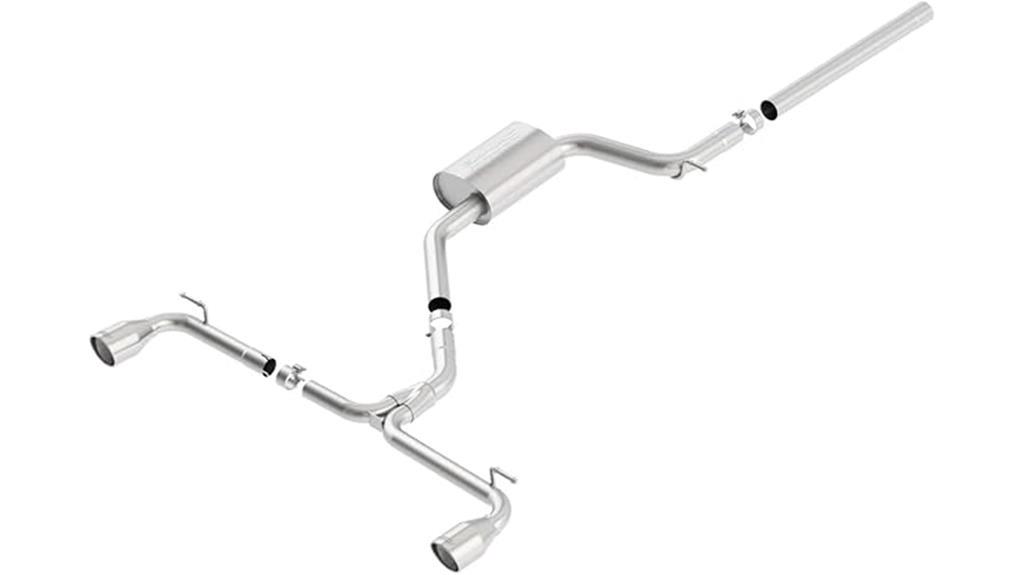
The BORLA Cat-Back Performance Exhaust System is an excellent choice for 2015-2017 Volkswagen Golf GTI MK7 owners looking to enhance their vehicle's performance and sound. Made from durable T-304 stainless steel, this system features a bolt-on, all-welded construction, ensuring a straightforward installation that can be completed with basic tools in about 30 minutes to 4 hours. Users appreciate the classic BORLA sound—moderate during cruising and aggressive at full throttle. Cold starts are particularly louder than stock, while DSG shifts create distinctive pops and "farts." With a customer rating of 4.3 out of 5, many recommend it for its balance of sound and performance, making it ideal for daily driving without excessive attention.
Best For: Volkswagen Golf GTI MK7 owners seeking to enhance their vehicle's performance and sound while maintaining a sporty yet subtle tone.
Pros:
- Classic BORLA sound that is moderate during cruising and aggressive at full throttle.
- Easy installation process that can be completed with basic tools in a short amount of time.
- Durable construction from T-304 stainless steel, ensuring longevity and performance.
Cons:
- Some users report minor rattles and a desire for a louder system with additional modifications.
- Sound may be less pronounced at lower RPMs or in automatic mode.
- Installation can take longer than expected due to challenges with old exhaust mounts.
BORLA Cat-Back Performance Exhaust System for Volkswagen Jetta GLI MK6
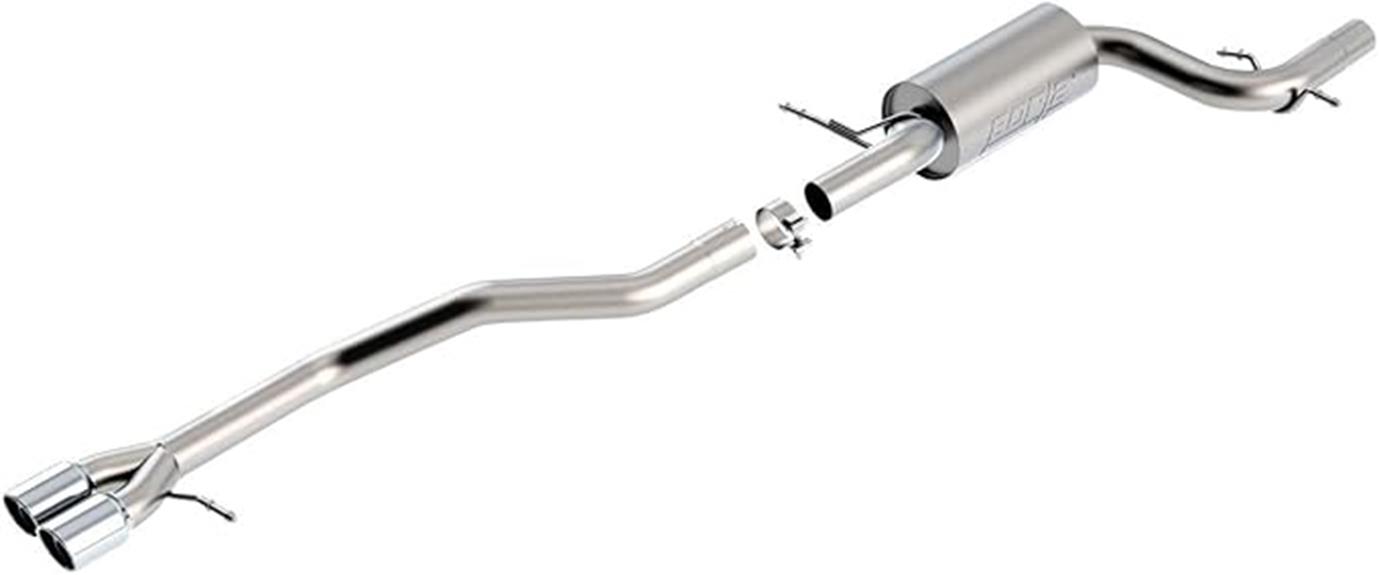
For enthusiasts seeking enhanced performance and sound from their 2012-2018 Volkswagen Jetta GLI MK6, the BORLA Cat-Back Performance Exhaust System stands out as an excellent choice. Crafted from T-304 stainless steel, this exhaust system offers a bolt-on installation that fits perfectly and takes roughly an hour to install. Users appreciate the deep, throaty growl during acceleration, with minimal drone at cruising speeds. It promises improved throttle response and a slight boost in fuel economy. While some drivers report minor drone at highway speeds, overall satisfaction remains high. Priced competitively, it even includes free shipping via Amazon. With ongoing enjoyment reported, the BORLA system is ideal for those wanting a performance upgrade without excessive noise.
Best For: Enthusiasts looking to upgrade their 2012-2018 Volkswagen Jetta GLI MK6 with a performance exhaust system that delivers enhanced sound and throttle response.
Pros:
- Improved throttle response and slight fuel economy boost.
- Deep, aggressive sound during acceleration with minimal cabin drone.
- Quick and easy bolt-on installation, fitting perfectly in about an hour.
Cons:
- Some users experience minor drone at highway speeds (75+ mph).
- Occasional reports of missing clamps affecting installation.
- Sound quality may vary based on individual expectations, with some describing it as low pitch.
Dsycar Exhaust Tips Pair for VW and BMW Vehicles
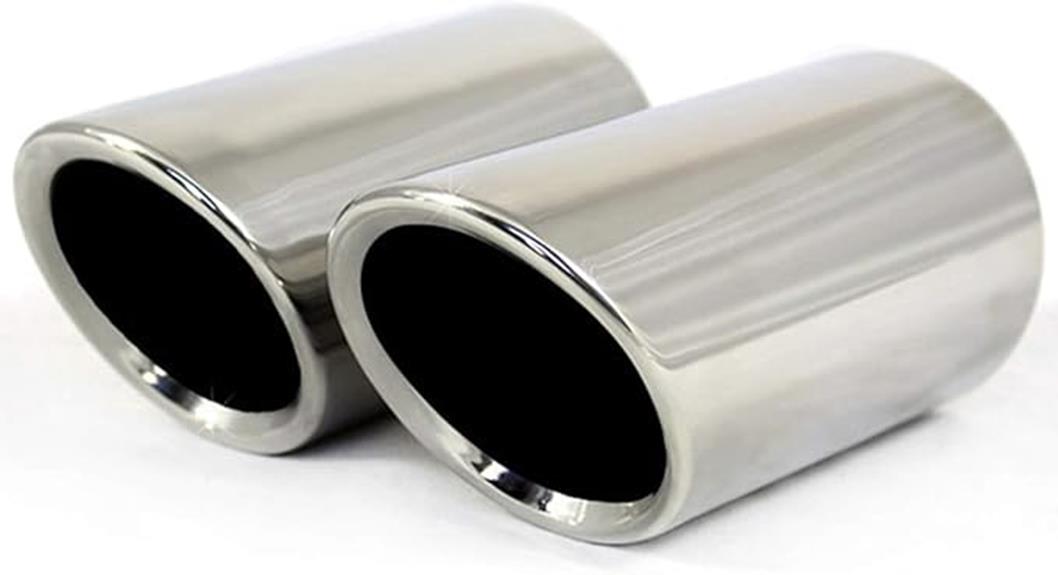
Offering compatibility with a range of Volkswagen and BMW models, the Dsycar Exhaust Tips Pair stands out as an ideal enhancement for enthusiasts seeking to elevate their vehicle's performance and aesthetics. Designed to fit vehicles like the VW Jetta, Golf 7, and BMW 325i/328i, these tips feature a length of 5.5 inches and a diameter of 2.75 inches, ensuring a perfect match for the 1.4T models. Crafted from high-quality 304 stainless steel, they resist corrosion while providing a polished, shiny finish. Installation is straightforward, requiring no welding or drilling, thanks to the secure attachment via four buckles. While users appreciate the elegant styling and ease of use, some have raised concerns about the chrome finish's durability in harsh conditions.
Best For: Car enthusiasts looking to enhance the performance and aesthetics of their VW or BMW vehicles with a stylish exhaust tip upgrade.
Pros:
- High-quality 304 stainless steel construction ensures durability and resistance to corrosion.
- Easy installation with no welding or drilling required, featuring secure attachment via four buckles.
- Elegant styling enhances the overall appearance of the vehicle, receiving positive feedback from users.
Cons:
- Some users have reported concerns about the durability of the chrome finish, particularly in harsh winter conditions.
- Feedback indicates possible issues with pitting and rust after prolonged exposure to environmental elements.
- Limited compatibility, only fitting specific models of VW and BMW vehicles.
Stainless 4 Pipe Exhaust, for Type 1 VW, Compatible with Dune Buggy
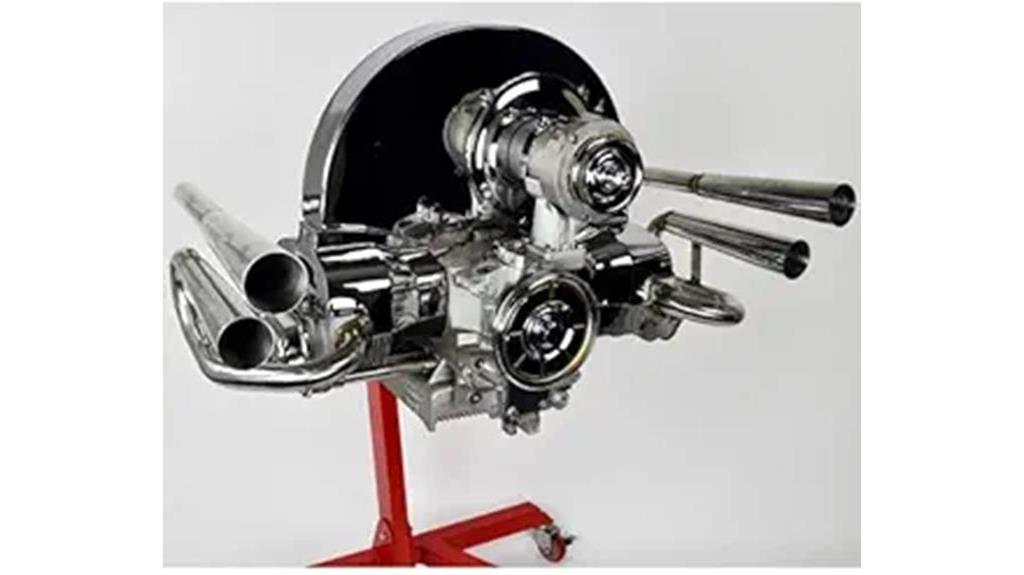
A stainless 4 pipe exhaust system stands out as an exceptional choice for Type 1 Volkswagen enthusiasts and dune buggy owners who crave a robust performance upgrade. This system is well-packaged and designed for easy installation, requiring no modifications and including new gaskets for a seamless fit. Users will appreciate the deeper tone it produces, which greatly enhances the driving experience, though it's worth noting that it's on the louder side—even with baffles—making it unsuitable for those who prefer a softer exhaust note. Its unique design not only boosts aesthetics but also provides easier access to engine components. Positive user feedback highlights the sound quality, installation ease, and the value offered by its stainless steel construction.
Best For: Type 1 VW enthusiasts and dune buggy owners looking for a loud, high-performance exhaust system.
Pros:
- Easy installation with no modifications required.
- Produces a deeper, more robust sound that enhances the driving experience.
- Durable stainless steel construction offers great value and longevity.
Cons:
- Loud sound may not be suitable for those preferring a quieter exhaust note.
- Unique appearance may not appeal to everyone's taste.
- Potentially less effective sound dampening with baffles in place.
MagnaFlow Performance Exhaust System for 2006-2009 Volkswagen GTI
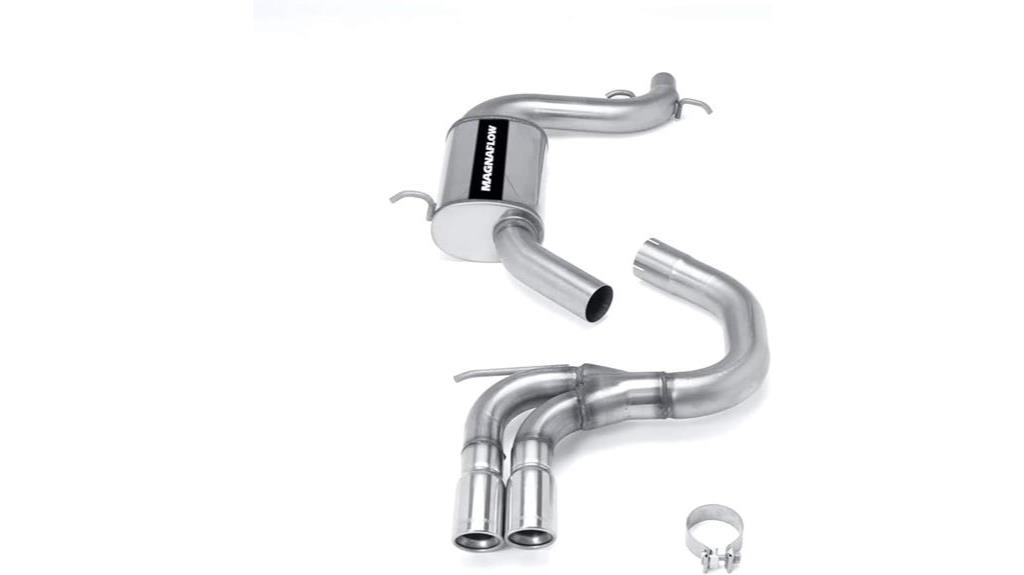
The MagnaFlow Performance Exhaust System 16691 stands out as an excellent choice for enthusiasts seeking to enhance their 2006-2009 Volkswagen GTI's performance and sound. This cat-back system features a dual center rear exit and is constructed from durable stainless steel, ensuring corrosion resistance and longevity. Weighing in at just 16 pounds, it's designed to improve horsepower and torque, with dyno-proven results supporting its performance claims. Users appreciate the system's mild tone with minimal drone, providing an enjoyable driving experience, especially during acceleration. Installation is user-friendly, making it accessible for most DIY enthusiasts. With a perfect 5.0 rating from customers, the MagnaFlow system is highly regarded for its fitment, sound quality, and overall value in the aftermarket segment.
Best For: This product is best for Volkswagen GTI enthusiasts looking to upgrade their exhaust system for improved performance and sound.
Pros:
- Power enhancement: Improves horsepower and torque with dyno-proven results.
- Quality construction: Made from durable stainless steel for corrosion resistance and longevity.
- User-friendly installation: Easy setup process suitable for most DIY enthusiasts.
Cons:
- Limited compatibility: Specifically designed for 2006-2009 Volkswagen GTI models only.
- Sound preference: The mild tone may not satisfy those seeking a louder exhaust note.
- Price point: As a quality aftermarket option, it may be pricier than some budget alternatives.
Factors to Consider When Choosing Exhaust for Volkswagen GTI
When choosing an exhaust system for your Volkswagen GTI, you'll want to think about several key factors. Consider sound characteristics, installation ease, and material quality to guarantee you get the best fit for your needs. Also, keep performance enhancements and compatibility in mind to maximize your vehicle's potential.
Sound Characteristics
Choosing the right exhaust system for your Volkswagen GTI involves understanding the sound characteristics that fit your driving style. Different exhaust setups produce various sounds, ranging from moderate volume at cruising speeds to an aggressive roar at full throttle. If you enjoy a little flair, certain systems create distinctive audio effects, like "farts" and pops during gear shifts or cold starts, enhancing your driving experience.
Keep in mind that the sound profile changes between low and high RPMs. Some systems are quieter at lower RPMs but really come alive at higher revs, delivering a more pronounced tone. If you often drive on the highway, look for systems that minimize drone, striking a balance between performance and daily usability.
Additionally, remember that the overall sound quality can be influenced by other modifications, such as ECU tuning and intake upgrades. These enhancements can lead to a louder, more aggressive exhaust note, adding to the excitement of driving your GTI. Consider these factors carefully to select an exhaust system that not only boosts performance but also aligns with your desired sound characteristics.
Installation Process
Selecting the right exhaust system for your Volkswagen GTI also involves considering the installation process. You'll typically find that most cat-back exhaust systems come with a bolt-on design, making installation quite straightforward. With basic tools, you can often complete the job in your driveway, with installation times ranging from 30 minutes to 4 hours, depending on the specific setup.
However, be prepared for some common challenges. Removing old rubber exhaust mounts can be tricky, and you'll need to verify the new system aligns correctly for ideal fitment. While many aftermarket systems are designed to fit well, you might have to make minor adjustments for a perfect installation.
Your experience can vary—some find the process easy, while others may need extra time or help if there are missing components. To minimize frustration, read through the instructions carefully, and consider checking online forums for tips and tricks from fellow GTI owners. By taking these factors into account, you can streamline the installation process and enjoy the enhanced performance and sound of your new exhaust system.
Material Quality
Material quality plays an essential role in the performance and longevity of your Volkswagen GTI's exhaust system. When choosing an exhaust, you'll want to contemplate options made from high-grade materials like T-304 stainless steel. This type of steel is renowned for its corrosion resistance and durability, making it ideal for withstanding extreme temperatures and harsh weather conditions.
A well-constructed exhaust system, especially those featuring all-welded construction, enhances the overall strength and integrity of the setup. This not only helps prevent rust and deterioration but also improves exhaust flow efficiency, which can lead to better throttle response.
Additionally, the material you choose will considerably influence the sound quality of your exhaust. Higher quality materials typically produce a more refined and appealing exhaust note, elevating your driving experience.
Performance Enhancements
When considering an exhaust upgrade for your Volkswagen GTI, performance enhancements should be at the forefront of your decision-making process. Upgrading to a cat-back exhaust system can greatly boost your horsepower and torque, giving you noticeable improvements in engine performance during acceleration. This upgrade isn't just about power; performance exhaust systems are designed to enhance throttle response across the RPM range, resulting in a more exhilarating and responsive driving experience.
Additionally, many aftermarket exhaust systems can even lead to slight improvements in fuel economy, with reports indicating potential gains of 2-4 MPG under normal driving conditions. A well-designed exhaust system can also produce a deeper, more aggressive sound profile, enhancing your overall driving enjoyment without causing excessive cabin drone during cruising.
Lastly, keep in mind that higher RPMs often yield better performance enhancements. It's crucial to choose an exhaust that complements your vehicle's capabilities, especially if you prefer manual driving modes. By focusing on these performance factors, you can guarantee your exhaust upgrade maximizes both power and enjoyment in your Volkswagen GTI.
Compatibility Considerations
Your Volkswagen GTI deserves an exhaust system that fits perfectly and performs at its best. When selecting an exhaust, first verify compatibility with your specific model year, as systems can differ considerably between generations like MK7 and MK7.5. It's essential to check if the exhaust is designed for your engine type—specifically the 2.0L turbo engine found in most GTIs—to guarantee peak performance and fitment.
Next, consider the installation method. Some systems are bolt-on, while others require welding; choose one that aligns with your skills and willingness to modify your vehicle. You'll also want to pay attention to the material used. T-304 stainless steel is a popular choice due to its durability and resistance to corrosion, making it ideal for long-term use.
Lastly, review customer feedback for insights on fitment issues or installation challenges that might arise with your specific model. Experiences from other GTI owners can provide invaluable information about which exhaust systems work best without complications. Taking these compatibility considerations into account will help you make an informed decision for your Volkswagen GTI.
Common Questions
Will an Aftermarket Exhaust Void My Volkswagen GTI Warranty?
Installing an aftermarket exhaust can potentially void your Volkswagen GTI warranty, but it depends on various factors. If the exhaust modification directly causes damage to a covered component, the manufacturer may refuse warranty claims related to that issue. However, if the modification doesn't affect the vehicle's reliability or safety, you might still be covered. It is crucial to check your warranty terms and consult with your dealer before making any modifications.
How Much Horsepower Can I Gain With a New Exhaust System?
When you install a new exhaust system, you can typically gain anywhere from 5 to 15 horsepower, depending on the brand and design. The increased airflow allows your engine to breathe better, improving efficiency and performance. However, factors like your vehicle's current setup and any additional modifications will also influence the exact horsepower gain. It's worth researching different options to find the right exhaust system that best suits your performance goals.
Are There Any Legal Restrictions on Exhaust Modifications?
When it comes to exhaust modifications, think of it as dancing on a fine line. You'll find that many regions impose legal restrictions, especially regarding noise levels and emissions. If you're considering an upgrade, check local laws to guarantee compliance. Some areas may require specific certifications or prohibit certain modifications altogether. Ignoring these rules could lead to fines or failed inspections, so it's wise to stay informed before making any changes.
How Often Should I Inspect My Exhaust System for Damage?
You should inspect your exhaust system regularly to catch any damage early. It's a good idea to check it every few months or before long trips. Look for signs of rust, leaks, or unusual noises when you start your car. If you're driving in harsh conditions, consider inspecting it more often. Keeping an eye on your exhaust will help maintain performance and prevent costly repairs down the line. Stay proactive!
Can I Install an Exhaust System Myself, or Should I Hire a Professional?
You can install an exhaust system yourself if you have the right tools and experience, but it might be wiser to hire a professional. DIY installation can save you money, but mistakes can lead to poor performance or damage. If you're confident in your skills and have proper guidance, go for it. Otherwise, a professional guarantees everything's done correctly and can offer insights that might enhance your vehicle's performance and sound.
Wrapping Up
Ready to elevate your Volkswagen GTI's performance and sound? With options like the BORLA Cat-Back and MagnaFlow systems, you're just a decision away from releasing a roar that'll turn heads. Imagine the thrill of that deep growl as you hit the gas, or the envy in your friends' eyes when they hear your upgraded ride. Don't wait—transform your driving experience now and discover which exhaust system will become your GTI's secret weapon on the road!